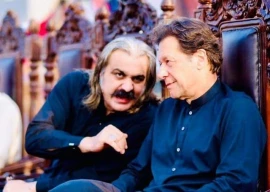
At the same time, officials here have said that substantive progress, such as the resumption of the composite dialogue between New Delhi and Islamabad, can happen only if Pakistan follows up on prosecuting those behind the Mumbai attacks.
This notion also came forward in meetings with the Observer Research Foundation, a New Delhi-based think tank, where a former foreign secretary said that the Indian prime minister was ready to move ahead on talks but was being held back by hawks within his party who feared such a move would “let Pakistan off the hook.”
The general perception emerging in briefings being held in the Indian capital are that, while the Manmohan Singh government is keen to move ahead in improving relations, Pakistan needs to show more progress on the trial of the Mumbai attacks suspects so that people in India are satisfied.
In his comments, Indian foreign office spokesman Vishnu Prakash commented that, while India is sympathetic with the situation in Pakistan with regards to terrorism, “the impact of what happened in Mumbai and its effect on the Indian psyche is not appreciated in Pakistan.” Joint Secretary Yash Sinha in his briefing also commented that Thimphu could well be the turning point for India-Pakistan relations.
The theme that most Indian officials and analysts have picked up on is the slow speed with which Pakistan is proceeding against suspects allegedly behind the Mumbai attacks. Fourteen months have passed, three judges have been changed as have two prosecution lawyers and only two witnesses have been produced. If Pakistan, they say, is able to show movement on this, the two countries can start talking.
Another point that has been raised here is whether Pakistan and India are at this point even interested in taking things forward. There are questions being raised on the ability and willingness of the Zardari government to move ahead. In this regard, the April visit of foreign minister Shah Mehmood Qureshi to New Delhi is been keenly anticipated. Many here are still sour over an earlier visit by Pakistan foreign secretary, Salman Basheer. One Indian retired official even said that Basheer was “publicly rude” during his interactions here. This showed how non-serious the Pakistani was at that time, he commented.
But Thimphu and Qureshi hold much promise. There are expectations of movement on the issue of liberalisation of the visa regime, increasing trade and releasing prisoners of each other’s countries.
At the same time, questions being asked in India are about Islamabad’s commitment to dialogue and peace. The message that seems to be coming out here is that while India has no option but peace talks because it is part of a greater goal of economic turnaround, no such desire exists in Pakistan at this stage. One official also speculated that back channel diplomacy was already in place for the leadership of the two countries to start talking. They point to the visit of former foreign minister Khurshid Mehmood Kasuri as a possible step in that direction.
Published in The Express Tribune, January 25th, 2011.
COMMENTS (16)
Comments are moderated and generally will be posted if they are on-topic and not abusive.
For more information, please see our Comments FAQ

















we are really frustated about these things..